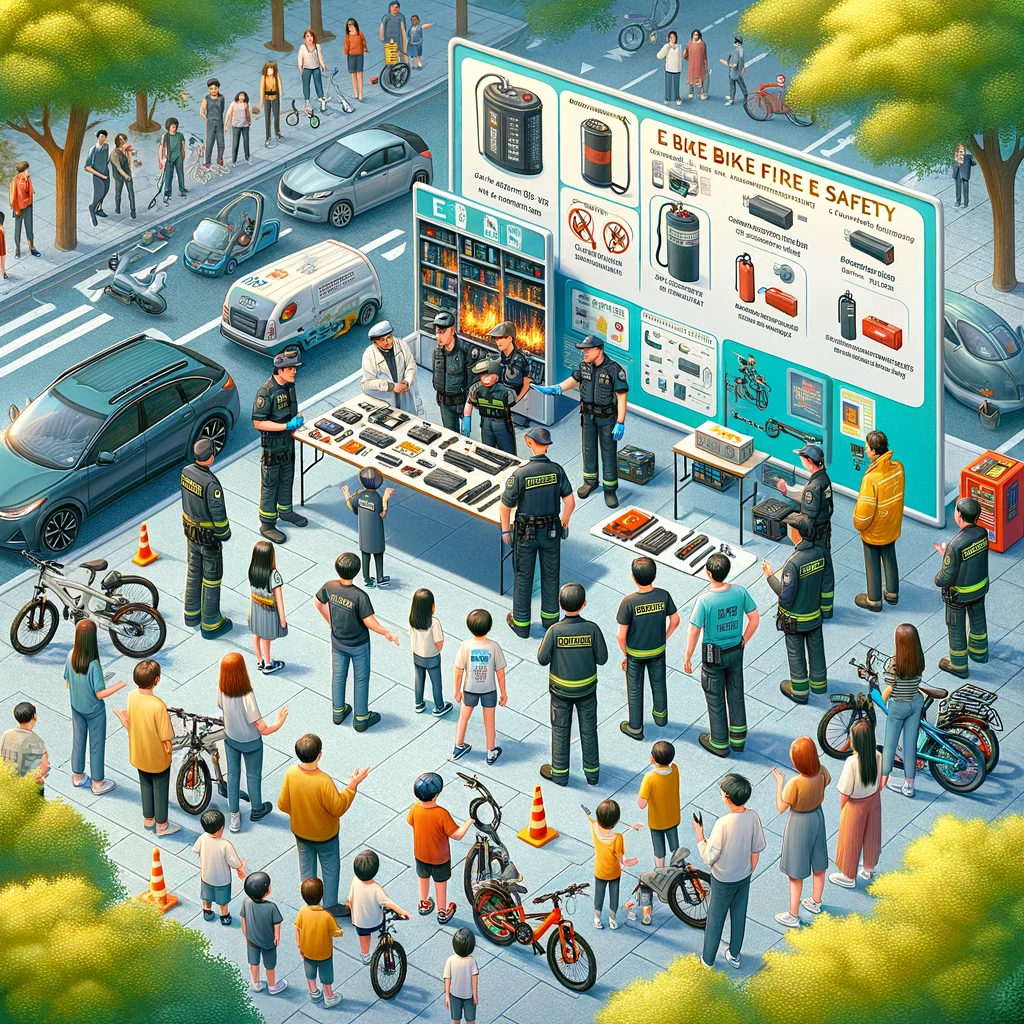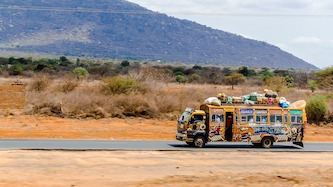E-bikes are becoming more popular, but there’s a problem with fire risks. Some people choose cheaper e-bikes with batteries that can be dangerous and cause fires. The lack of rules and fake batteries in the market make the problem worse. Fires caused by these batteries can spread quickly, making it hard for firefighters to respond in time.
The market for electric bikes, scooters, and mopeds is growing, which is good for the environment. But the safety rules for e-bikes haven’t kept up with this growth. In the UK, there are no rules about chargers or kits to turn regular bikes into e-bikes. Batteries that don’t work well with the bikes and aren’t certified are a big reason why fires happen. People with less money might not be able to get the right parts or find a good repair shop to make their e-bikes safe.
To make e-bikes safer, riders can take some precautions. They should charge their bikes on flat surfaces and not block the exit to their homes. It’s also important to keep the bikes away from things that can catch fire and not leave the battery charging overnight. Some places have made rules to help with the fire risks, like having safety standards for chargers and electrical systems in China, and needing certification for e-bikes and batteries in New York City.
To make sure e-bikes are safe, it’s important to use batteries with smart systems that shut down if there’s a problem. Charging stations and places to swap batteries can also help reduce fire risks. Delivery companies, big food chains, and governments should invest in making e-bikes safer to protect people’s lives and get the benefits of this technology.
In conclusion, e-bikes are good for the environment, but we need to think about the fire risks. We need rules, better batteries, and places to charge the bikes to make sure they’re safe.
Original news source: Why the e-bike boom is raising fire fears (BBC)
🎧 Listen:
Slow
Normal
Fast
📖 Vocabulary:
| 1 | popular | Liked or enjoyed by many people |
| 2 | batteries | Devices that store energy and can power things like electric bikes |
| 3 | dangerous | Capable of causing harm or injury |
| 4 | fires | Bright, hot flames that can destroy things |
| 5 | regulations | Official rules or guidelines that control how something is done |
| 6 | certified | Officially recognized as meeting the essential requirements, often for quality and safety |
| 7 | precautions | Actions taken to prevent something dangerous or unpleasant from happening |
| 8 | chargers | Devices used to put energy back into batteries |
| 9 | overnight | Throughout the entire night |
| 10 | certification | The process of verifying that something meets a set standard of quality or safety |
| 11 | environment | The natural world, including all living things and the places where they live |
| 12 | safety | The condition of being protected from or unlikely to cause danger, risk, or injury |
| 13 | investments | The act of putting money into something to get a return or achieve a goal |
| 14 | technology | The application of scientific knowledge for practical purposes, especially in industry |
| 15 | risks | Possibilities of something bad happening |
Group or Classroom Activities
Warm-up Activities:
– News Summary
Instructions: Divide the class into pairs or small groups. Give each group a few minutes to read the article. Then, instruct them to write a summary of the article in their own words. After they finish, have each group share their summary with the rest of the class.
– Opinion Poll
Instructions: Create a list of questions related to the article, such as “Do you think e-bikes are a good alternative to traditional bikes?” or “Should there be stricter regulations for e-bike batteries?” Divide the class into pairs and have them ask each other the questions, recording their partner’s answers. Afterward, have a class discussion and ask some groups to share their partner’s opinions.
– Vocabulary Pictionary
Instructions: Select 10-15 vocabulary words from the article, such as “fire risks,” “certified,” or “charging stations.” Write each word on a separate index card. Divide the class into teams and give each team a set of index cards. One member from each team will come to the front of the class and draw a picture to represent one of the vocabulary words. The rest of their team must guess the word based on the drawing. The team that guesses the most words correctly wins.
– Keyword Hangman
Instructions: Choose 5-10 important keywords from the article and write dashes on the board to represent each letter of the word. Divide the class into teams and have them take turns guessing letters to try and uncover the keyword. If a team guesses a correct letter, write it in the correct place on the board. If a team guesses an incorrect letter, start drawing the hangman. The team that guesses the keyword first wins.
– Future Predictions
Instructions: Have a class discussion about the future of e-bikes. Ask students to make predictions about how e-bikes will be used in the future, the advancements in battery technology, and the impact on transportation. Encourage students to support their predictions with information from the article or their own opinions. After the discussion, have each student write down their predictions and share them with a partner.
🤔 Comprehension Questions:
1. What is the problem with some e-bikes that can cause fires?
2. How does the lack of rules and fake batteries make the fire problem worse?
3. Why is it difficult for firefighters to respond to fires caused by e-bike batteries?
4. What is happening to the market for electric bikes, scooters, and mopeds?
5. Why haven’t the safety rules for e-bikes kept up with the growth of the market?
6. How can people with less money have trouble making their e-bikes safe?
7. What precautions can riders take to make their e-bikes safer?
8. What are some measures that have been taken to reduce the fire risks of e-bikes?
Go to answers ⇩
🎧✍️ Listen and Fill in the Gaps:
E-(1)______ are becoming more popular, but there’s a (2)______ with fire risks. Some people choose cheaper e-bikes with batteries that can be dangerous and cause (3)______. The lack of rules and fake batteries in the market make the problem worse. Fires caused by these batteries can spread quickly, making it hard for (4)______ to respond in time.
The market for electric bikes, scooters, and mopeds is growing, which is good for the environment. But the safety rules for e-bikes haven’t kept up with this growth. In the UK, there are no rules about chargers or kits to turn regular bikes into e-bikes. Batteries that don’t work well with the bikes and aren’t (5)______ are a big reason why fires happen. People with less money might not be able to get the (6)______ parts or find a good (7)______ shop to make their e-bikes safe.
To make e-bikes safer, (8)______ can take some precautions. They should charge their bikes on flat surfaces and not block the exit to their homes. It’s also important to keep the bikes away from things that can catch fire and not leave the battery (9)______ overnight. Some (10)______ have made rules to help with the fire risks, like (11)______ safety standards for chargers and (12)______ systems in China, and needing certification for e-bikes and batteries in New York City.
To make sure e-bikes are safe, it’s important to use batteries with smart systems that shut down if there’s a problem. Charging stations and places to swap batteries can also help reduce fire risks. Delivery companies, big food chains, and governments should invest in making e-bikes safer to protect people’s (13)______ and get the benefits of this technology.
In conclusion, e-bikes are good for the (14)______, but we need to think about the fire risks. We need rules, (15)______ batteries, and places to (16)______ the bikes to make sure they’re safe.
Go to answers ⇩
💬 Discussion Questions:
Students can ask a partner these questions, or discuss them as a group.
1. What is an e-bike and why are they becoming more popular?
2. How would you feel if you found out that the e-bike you bought had a dangerous battery that could cause fires?
3. Do you like the idea of using e-bikes as a way to help the environment? Why or why not?
4. Do you think it’s important for there to be rules and regulations for e-bikes to ensure safety? Why or why not?
5. How would you feel if you couldn’t afford the right parts or find a good repair shop to make your e-bike safe?
6. What precautions can riders take to make their e-bikes safer?
7. Do you think it’s a good idea to charge e-bikes on flat surfaces and not block the exit to your home? Why or why not?
8. How would you feel if you were told to keep your e-bike away from things that can catch fire and not leave the battery charging overnight?
9. What do you think about the idea of having safety standards for chargers and electrical systems for e-bikes?
10. Do you think it’s important for e-bikes and batteries to have certification to ensure they are safe? Why or why not?
11. How do you think smart systems that shut down if there’s a problem can make e-bikes safer?
12. Why do you think it’s important to have charging stations and places to swap batteries for e-bikes?
13. Do you think delivery companies, big food chains, and governments should invest in making e-bikes safer? Why or why not?
14. How do you think investing in safer e-bikes can protect people’s lives?
15. What do you think are the benefits of using e-bikes?
Individual Activities
📖💭 Vocabulary Meanings:
Match each word to its meaning.
Words:
1. popular
2. batteries
3. dangerous
4. fires
5. regulations
6. certified
7. precautions
8. chargers
9. overnight
10. certification
11. environment
12. safety
13. investments
14. technology
15. risks
Meanings:
(A) Official rules or guidelines that control how something is done
(B) Bright, hot flames that can destroy things
(C) Officially recognized as meeting the essential requirements, often for quality and safety
(D) Possibilities of something bad happening
(E) The act of putting money into something to get a return or achieve a goal
(F) The process of verifying that something meets a set standard of quality or safety
(G) The natural world, including all living things and the places where they live
(H) Actions taken to prevent something dangerous or unpleasant from happening
(I) Capable of causing harm or injury
(J) The condition of being protected from or unlikely to cause danger, risk, or injury
(K) Liked or enjoyed by many people
(L) Devices used to put energy back into batteries
(M) The application of scientific knowledge for practical purposes, especially in industry
(N) Throughout the entire night
(O) Devices that store energy and can power things like electric bikes
Go to answers ⇩
🔡 Multiple Choice Questions:
1. What is the main problem with some cheaper e-bikes?
(a) They are not good for the environment.
(b) They have batteries that can be dangerous and cause fires.
(c) They are difficult to ride.
(d) They are too expensive.
2. Why do fires caused by e-bike batteries spread quickly?
(a) Because they can be difficult for firefighters to respond to in time.
(b) Because the batteries are fake and not certified.
(c) Because the bikes are made of flammable materials.
(d) Because the chargers are not safe.
3. What is one reason why some people might not be able to make their e-bikes safe?
(a) They don’t know how to ride a bike.
(b) They don’t have access to a flat surface to charge their bikes.
(c) They don’t have a safe place to store their bikes.
(d) They don’t have enough money to get the right parts or find a good repair shop.
4. What precautions can riders take to make their e-bikes safer?
(a) Block the exit to their homes when charging their bikes.
(b) Leave the battery charging overnight.
(c) Use uncertified batteries.
(d) Charge their bikes on flat surfaces and keep them away from things that can catch fire.
5. What safety standards have been implemented in China to help with the fire risks of e-bikes?
(a) Certification for e-bikes and batteries.
(b) Charging stations and battery swapping places.
(c) Safety standards for chargers and electrical systems.
(d) None of the above.
6. Who should invest in making e-bikes safer?
(a) Only the government.
(b) Delivery companies, big food chains, and governments.
(c) Only the riders of e-bikes.
(d) Only the manufacturers of e-bikes.
7. What is the main conclusion of the article?
(a) E-bikes are too expensive and not worth the investment.
(b) E-bikes are not good for the environment and should be banned.
(c) E-bikes are good for the environment, but we need to think about the fire risks and make them safer.
(d) E-bikes are safe and do not pose any fire risks.
8. What is one thing that needs to be done to make e-bikes safer?
(a) Use batteries with smart systems that shut down if there’s a problem.
(b) Ban the use of e-bikes altogether.
(c) Increase the price of e-bikes to ensure better quality.
(d) Only allow certified repair shops to work on e-bikes.
Go to answers ⇩
🕵️ True or False Questions:
1. People with limited financial resources may easily obtain the correct parts or find a reliable repair shop to ensure the safety of their e-bikes.
2. Batteries that are not certified and do not work well with e-bikes are a major cause of fires.
3. The lack of regulations and the presence of fake batteries in the market worsen the problem of e-bike fires.
4. In the UK, there are regulations regarding chargers and kits to convert regular bikes into e-bikes.
5. Precautions such as charging e-bikes on slanted surfaces, placing them near flammable objects, and doing overnight charging can help make them riskier.
6. The safety rules for e-bikes have kept up with the growth of the market for electric bikes, scooters, and mopeds.
7. The popularity of e-bikes is increasing, but there is a problem with fire risks associated with cheaper models.
8. Fires caused by e-bike batteries can spread quickly, making it difficult for firefighters to respond in time.
Go to answers ⇩
📝 Write a Summary:
Write a summary of this news article in two sentences.
Check your writing now with the best free AI for English writing!
Writing Questions:
Answer the following questions. Write as much as you can for each answer.
Check your answers with our free English writing assistant!
1. What is the problem with some e-bikes that are currently on the market?
2. Why is it difficult for firefighters to respond to fires caused by e-bike batteries?
3. What is one reason why fires happen with e-bikes?
4. What precautions can riders take to make their e-bikes safer?
5. What are some ways that governments and companies can help reduce the fire risks associated with e-bikes?
✅ Answers
🤔✅ Comprehension Question Answers:
1. What is the problem with some e-bikes that can cause fires?
Some e-bikes have batteries that can be dangerous and cause fires.
2. How does the lack of rules and fake batteries make the fire problem worse?
The lack of rules means that there are no safety standards for e-bike batteries, which can be dangerous. Additionally, fake batteries may not be made with the proper safety measures, increasing the risk of fires.
3. Why is it difficult for firefighters to respond to fires caused by e-bike batteries?
Fires caused by e-bike batteries can spread quickly, making it hard for firefighters to respond in time.
4. What is happening to the market for electric bikes, scooters, and mopeds?
The market for electric bikes, scooters, and mopeds is growing.
5. Why haven’t the safety rules for e-bikes kept up with the growth of the market?
The safety rules for e-bikes haven’t kept up with the growth of the market because they haven’t been updated to address the new technologies and risks associated with e-bikes.
6. How can people with less money have trouble making their e-bikes safe?
People with less money might not be able to afford the right parts or find a good repair shop to make their e-bikes safe.
7. What precautions can riders take to make their e-bikes safer?
Riders can charge their bikes on flat surfaces, not block the exit to their homes, keep the bikes away from things that can catch fire, and not leave the battery charging overnight.
8. What are some measures that have been taken to reduce the fire risks of e-bikes?
Some measures that have been taken to reduce the fire risks of e-bikes include having safety standards for chargers and electrical systems, requiring certification for e-bikes and batteries, and using batteries with smart systems that shut down if there’s a problem. Charging stations and places to swap batteries can also help reduce fire risks.
Go back to questions ⇧
🎧✍️✅ Listen and Fill in the Gaps Answers:
(1) bikes
(2) problem
(3) fires
(4) firefighters
(5) certified
(6) right
(7) repair
(8) riders
(9) charging
(10) places
(11) having
(12) electrical
(13) lives
(14) environment
(15) better
(16) charge
Go back to questions ⇧
📖💭✅ Vocabulary Meanings Answers:
1. popular
Answer: (K) Liked or enjoyed by many people
2. batteries
Answer: (O) Devices that store energy and can power things like electric bikes
3. dangerous
Answer: (I) Capable of causing harm or injury
4. fires
Answer: (B) Bright, hot flames that can destroy things
5. regulations
Answer: (A) Official rules or guidelines that control how something is done
6. certified
Answer: (C) Officially recognized as meeting the essential requirements, often for quality and safety
7. precautions
Answer: (H) Actions taken to prevent something dangerous or unpleasant from happening
8. chargers
Answer: (L) Devices used to put energy back into batteries
9. overnight
Answer: (N) Throughout the entire night
10. certification
Answer: (F) The process of verifying that something meets a set standard of quality or safety
11. environment
Answer: (G) The natural world, including all living things and the places where they live
12. safety
Answer: (J) The condition of being protected from or unlikely to cause danger, risk, or injury
13. investments
Answer: (E) The act of putting money into something to get a return or achieve a goal
14. technology
Answer: (M) The application of scientific knowledge for practical purposes, especially in industry
15. risks
Answer: (D) Possibilities of something bad happening
Go back to questions ⇧
🔡✅ Multiple Choice Answers:
1. What is the main problem with some cheaper e-bikes?
Answer: (b) They have batteries that can be dangerous and cause fires.
2. Why do fires caused by e-bike batteries spread quickly?
Answer: (a) Because they can be difficult for firefighters to respond to in time.
3. What is one reason why some people might not be able to make their e-bikes safe?
Answer: (d) They don’t have enough money to get the right parts or find a good repair shop.
4. What precautions can riders take to make their e-bikes safer?
Answer: (d) Charge their bikes on flat surfaces and keep them away from things that can catch fire.
5. What safety standards have been implemented in China to help with the fire risks of e-bikes?
Answer: (c) Safety standards for chargers and electrical systems.
6. Who should invest in making e-bikes safer?
Answer: (b) Delivery companies, big food chains, and governments.
7. What is the main conclusion of the article?
Answer: (c) E-bikes are good for the environment, but we need to think about the fire risks and make them safer.
8. What is one thing that needs to be done to make e-bikes safer?
Answer: (a) Use batteries with smart systems that shut down if there’s a problem.
Go back to questions ⇧
🕵️✅ True or False Answers:
1. People with limited financial resources may easily obtain the correct parts or find a reliable repair shop to ensure the safety of their e-bikes. (Answer: False)
2. Batteries that are not certified and do not work well with e-bikes are a major cause of fires. (Answer: True)
3. The lack of regulations and the presence of fake batteries in the market worsen the problem of e-bike fires. (Answer: True)
4. In the UK, there are regulations regarding chargers and kits to convert regular bikes into e-bikes. (Answer: False)
5. Precautions such as charging e-bikes on slanted surfaces, placing them near flammable objects, and doing overnight charging can help make them riskier. (Answer: False)
6. The safety rules for e-bikes have kept up with the growth of the market for electric bikes, scooters, and mopeds. (Answer: False)
7. The popularity of e-bikes is increasing, but there is a problem with fire risks associated with cheaper models. (Answer: True)
8. Fires caused by e-bike batteries can spread quickly, making it difficult for firefighters to respond in time. (Answer: True)
Go back to questions ⇧















